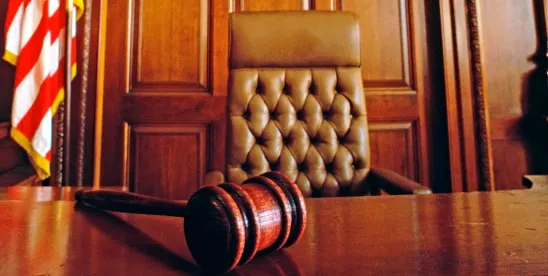Go-To Guide:
Companies that timely and voluntarily self-report misconduct, including in the environmental arena, are likely to benefit from the DOJ’s new policy changes
Companies should have a process in place to internally report and then promptly investigate and evaluate potential environmental enforcement issues when they arise, in order to consider whether self-reporting is appropriate
Companies without an Environmental Management System (EMS) program should also consider developing and implementing one
Companies should continually evaluate and periodically audit their existing compliance programs, including their EMS and Environmental, Social, and Governance (ESG) systems, to ensure they remain robust
Executive compensation arrangements should incentivize environmental compliance and deter risky behavior
Corporate culture should generally aim to reinforce environmental performance and compliance
In a speech on Sept. 15, 2022, Deputy Attorney General (DAG) Lisa O. Monaco announced several significant updates to U.S. Department of Justice (DOJ) policies on investigating and prosecuting corporate crime. With her speech, DOJ simultaneously published a 15-page memo (the “2022 Monaco Memo”), further detailing these policy changes. As DAG Monaco explains, the policy changes reflect “a combination of carrots and sticks—with a mix of incentives and deterrence” to provide corporate legal and compliance leaders with “the tools they need to make a business case for responsible corporate behavior.”
The 2022 Monaco Memo is the most recent version of a long string of DOJ policy statements on corporate enforcement dating back to the 1999 “Holder Memo.” These reflect DOJ’s evolving position on the factors DOJ will consider in deciding whether to charge corporations and employees with criminal misconduct. From an environmental compliance perspective, DOJ’s enforcement policies should be viewed in the broader context of related U.S. Environmental Protection Agency (EPA) policies (and those of their state equivalents) and their impact on companies’ sustainability and ESG initiatives. All of these policies provide important guidance on the design and implementation of effective systems to prevent, detect, correct, and mitigate environmental incidents that can result in civil or criminal liability to corporations and individuals, as well as liability to third parties and reputational harm.
GT previously summarized some of the key areas that the new DOJ policy changes emphasize, namely (1) a corporation’s history of misconduct, (2) corporate culture (i.e., a company culture that rejects wrongdoing and fosters compliance), (3) individual accountability (i.e., the identification of all individuals responsible for a corporate crime), and (4) independent compliance monitorships. Here, we build upon that earlier GT Alert and discuss the practical implications of the policy changes for companies from an environmental perspective.
Key Messages From the 2022 Monaco Memo
Evaluating History of Corporate Misconduct
DOJ’s enforcement discretion will not be limited to its evaluation of the alleged misconduct at issue: it will review the company’s compliance history to determine if the alleged misconduct reflects a pattern that merits criminal enforcement. This will include an evaluation of a company’s “full criminal, civil, and regulatory record,” not just past criminal conduct. This evaluation will involve several considerations, including:
-
DOJ will put greater weight on criminal conduct involving the same employees as the current misconduct.
-
DOJ will generally reach back five years for civil or regulatory non-compliance and 10 years for past criminal conduct, placing less weight on “dated” violations taking place before then.
-
DOJ will evaluate if the current misconduct shares similar traits as the prior misconduct and if repeated misconduct reflects the absence of compliance culture, compliance practices, or “institutional safeguards.”
-
For companies that operate in a highly regulated industry, DOJ will evaluate how a company’s compliance history compares to similarly situated companies in that industry.
-
A company that acquires an entity with a history of compliance problems normally will not be downgraded if those problems are appropriately remediated following the acquisition.
This emphasis on past misconduct is consistent with EPA’s enforcement practices and those of many states. For example, the Texas Commission on Environmental Quality calculates compliance history scores for operating facilities that are used in everything from permitting decisions to enforcement actions. Maintaining a good compliance record is essential to building “capital” not only with enforcers and regulators but also with other stakeholders.
Encouraging Voluntary Self-Disclosure
DOJ strongly encourages corporations to voluntarily self-disclose misconduct before an investigation commences. Moreover, DAG Monaco now directs that DOJ prosecutors “must ensure that a corporation benefits from its decision to come forward to the Department and voluntarily self-disclose misconduct, through resolution under more favorable terms than if the government had learned of the misconduct through other means” (emphasis added).
The 2022 Monaco Memo highlights two “core principles” regarding voluntary self-disclosure. First, absent aggravating factors, DOJ will not “seek a guilty plea when a company has voluntarily self-disclosed, cooperated, and remediated misconduct.” Second, DOJ will not “require the imposition of an independent compliance monitor” if the company has implemented and tested an effective compliance program by the time of any resolution between the company and DOJ.
These DOJ principles are aligned with EPA’s “Audit Policy” (formally titled “Incentives for Self-Policing: Discovery, Disclosure, Correction and Prevention of Violations”), which has been in place since 1995 and amended several times since then. The U.S. Sentencing Guidelines’ provisions on corporate ethics and compliance programs also emphasize the value of voluntary disclosure, which in the Guidelines is also tied to internal reporting and investigation procedures. Many states have similar policies encouraging self-disclosure of detected environmental non-compliance by eliminating or at least decreasing penalties in most circumstances.
Examination of Corporate Compliance Program and Compensation Structure
DOJ and EPA have, for decades, evaluated the effectiveness of compliance programs when deciding what, if any, enforcement action to take. In her most recent speech, DAG Monaco announced that, when evaluating a company’s compliance program, DOJ will favor companies with compensation systems that provide affirmative incentives for compliance-promoting behavior and incorporate deterrence measures—such as clawback provisions or partial escrowing of compensation—that enable penalties to be imposed against individuals whose actions or omissions contributed to criminal conduct.
Focus on Individual Accountability
In an Oct. 28, 2021 memo, also by DAG Monaco, DOJ announced that corporate “cooperation credit” will only be available to a company that identifies all individuals involved in misconduct, without regard to their position, status, or seniority. As an extension of this pronouncement, DAG Monaco’s most recent remarks emphasize that DOJ’s newest policies are designed to expedite investigations into individual accountability. To this end, DOJ asserts that cooperating companies must produce all relevant, non-privileged evidence about individual misconduct in a “timely” manner in order to receive full cooperation credit. Where prosecutors identify undue or intentional delay in a cooperating company’s production, especially with respect to any “hot documents or evidence,” cooperation credit will be reduced or eliminated. This reflects an ongoing debate between DOJ and defense counsel on issues of attorney-client privilege and the rights of individual defendants that will not be resolved by DAG Monaco’s most recent remarks or memo.
Increased Use of Independent Compliance Monitors
DOJ reiterated it is rescinding any earlier guidance suggesting that corporate monitorships are disfavored. DOJ is expected to release new guidance for prosecutors to assist with identifying the need for a monitor, the selection of a monitor, and the oversight of a monitor’s work.
Implications for Companies for Environmental Compliance
The new DOJ policies make clear that companies should take a close look at their environmental compliance and management systems aimed at achieving and improving compliance with environmental laws and environmental performance generally. This evaluation should take into account related policies, such as those announced by EPA and the U.S. Sentencing Commission. It might also be prudent to evaluate these systems in light of whatever ESG commitments a company is making.
Given DOJ’s (and EPA’s) focus on voluntary self-disclosure and the speed by which a company seeking cooperation credit acts, these systems should include a process to internally report and then promptly investigate and evaluate potential environmental enforcement issues when they arise, so that an informed decision can be made as to whether the company should voluntarily self-disclose to DOJ (or EPA and states) before any investigation or public reporting of alleged wrongdoing. This may place the company in a position to garner favorable benefits.
Effective environmental compliance and management systems are not just about procedures and data. A corporate culture that explicitly reinforces good environmental performance and compliance with environmental laws may not only decrease the likelihood of misconduct but also result in a more favorable (or at least less negative) response from the enforcers should a problem occur. In addition, a positive corporate culture built on the framework of robust compliance and management systems may provide effective support for credible ESG initiatives.
Finally, because environmental cases often involve complex chemical, physical, or technical issues and data, DOJ may be more likely to impose monitorships as part of any environmental crime resolution against a company. Forthcoming DOJ policies will dictate when a monitor will be necessary, but the notion that monitorships are now favored by DOJ should be considered by all companies as signaling the need for evaluations of, potential changes to, and, if necessary, overhauls of, corporate culture and internal processes, procedures, and practices geared towards compliance, prevention, and reporting.






 />i
/>i

